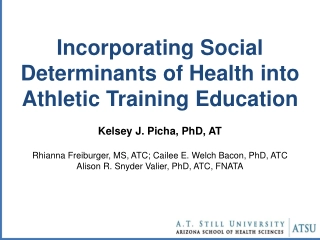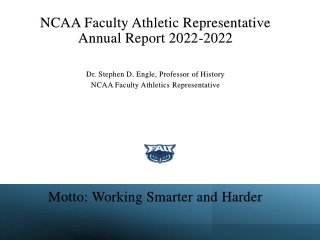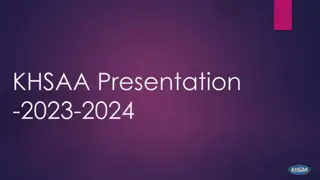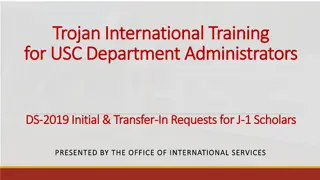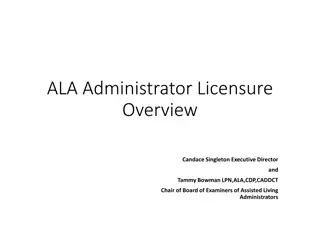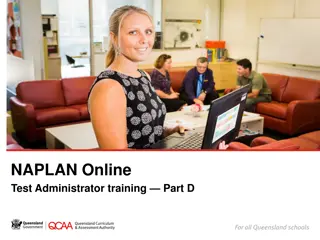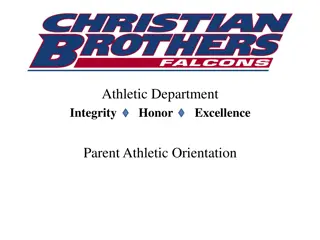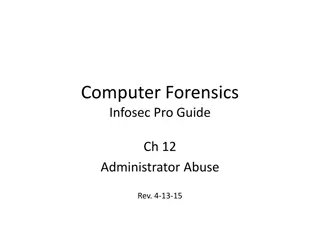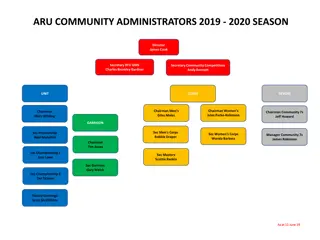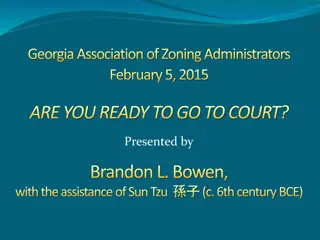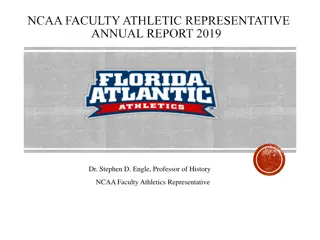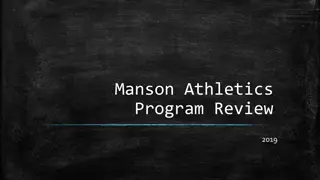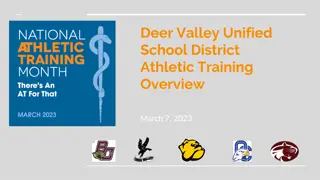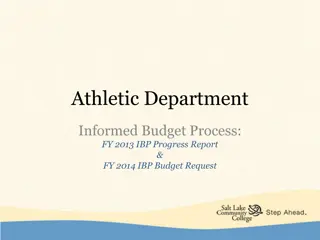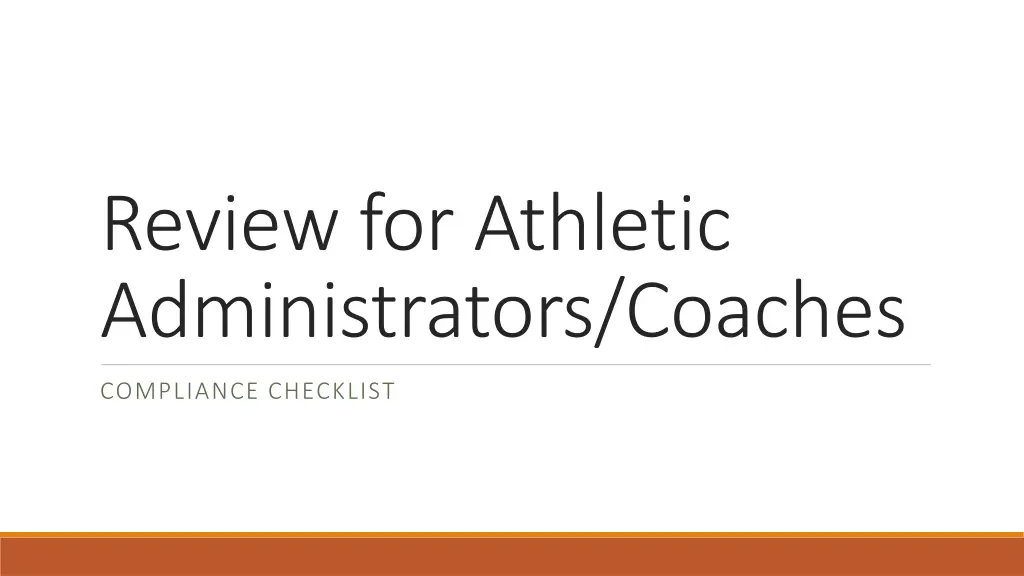
Compliance Checklist for Athletic Administrators and Coaches in NCAA Programs
Ensure compliance with NCAA mandates on sexual violence prevention, civil rights equity policies, and complaint resolution procedures with this comprehensive checklist designed for athletic administrators and coaches. Stay informed on core values, collaboration efforts, educational programming, and student-athlete engagement to foster a culture of prevention and responsibility in athletics.
Uploaded on | 0 Views
Download Presentation

Please find below an Image/Link to download the presentation.
The content on the website is provided AS IS for your information and personal use only. It may not be sold, licensed, or shared on other websites without obtaining consent from the author. If you encounter any issues during the download, it is possible that the publisher has removed the file from their server.
You are allowed to download the files provided on this website for personal or commercial use, subject to the condition that they are used lawfully. All files are the property of their respective owners.
The content on the website is provided AS IS for your information and personal use only. It may not be sold, licensed, or shared on other websites without obtaining consent from the author.
E N D
Presentation Transcript
Review for Athletic Administrators/Coaches COMPLIANCE CHECKLIST
Agenda NCAA s Mandate/Core Values/Sexual Violence Prevention Tool-Kit Rose-Hulman Policy for Civil Rights Equity Rose-Hulman Complaint Resolution Procedure for Civil Rights Equity Distribution of materials (coming soon!) Reporting Overview Rights of the Reporting Party Rights of the Responding Party A Few Important Things
NCAA Mandate: Sexual Violence Prevention Tool-Kit Core 1 (Leadership) Sexual violence prevention must be a priority for athletics directors and college presidents Core 2 (Collaboration) Meaningful progress in sexual violence prevention efforts requires cross-campus collaboration Core 3 (Compliance and Responsibility) Colleges and universities must comply with federal laws, state laws, institutional policies, and NCAA regulations and are accountable for prevention
NCAA Mandate: Sexual Violence Prevention Tool-Kit Core 4 (Education) Effective educational programming changes behaviors and cultures Core 5 (Student-Athlete Engagement) Involvement in outreach efforts and visible participants in broader campus and societal efforts to prevent sexual violence Core 6 (Culture Change: An Essential Effort) Support and voice of the Athletics Departments
Rose-Hulman Policy for Civil Rights Equity https://www.rose-hulman.edu/about-us/human-resources/title-ix-rhit-policy- for-civil-rights-equity.pdf
Rose-Hulman Complaint Resolution Procedure for Civil Rights Equity https://www.rose-hulman.edu/about-us/human-resources/title-ix-rhit-policy- for-civil-rights-equity.pdf
Distribution of Materials The college or university s nondiscrimination policy addresses sexual harassment and sexual violence and is posted and disseminated throughout the athletics department. The name and contact information for the campus Title IX Coordinator/s is posted and disseminated throughout the athletics department.
Reporting Overview Methods to report a sexual violence complaint Anonymous Reporting Online form National Sexual Assault Hotline 1-800-656-4673 (24 hours per day) Confidential reporting Student Counseling Center Health Services National Sexual Assault Hotline 1-800-656-4673 (24 hours per day) Non-confidential reporting Self-report Staff, faculty, RA/SA staff (Mandatory Reporters) All employees receiving reports, observing potential violations, or otherwise being put on notice of a potential violation of Rose-Hulman policy are expected to promptly contact the Title IX Coordinator/s within 24 hours of becoming aware of a report or incident. It is also possible for employees to notify a supervisor, or for students to notify an academic advisor or faculty member. These individuals will in turn notify the Title IX Coordinator/s.
Reporting Party Rights Statement of the Rights of a Party Bringing a Complaint To be treated with respect by Rose-Hulman officials. To take advantage of campus support resources for students (i.e. Counseling Services and Rose-Hulman Health Services) and for employees (i.e. the Office of Human Resources, the Employee Relations Committee, and/or the Ombudsman Committee, who are the Staff and Faculty Representatives to the Board of Trustees). To experience a safe living, educational, and work environment. To have advocate process advisor during this process. To be accompanied by an individual of their choice throughout the process. To refuse to have an allegation resolved through conflict resolution procedures.
Reporting Party Rights Statement of the Rights of a Party Bringing a Complaint To receive institutional amnesty for minor student misconduct (such as alcohol or drug violations) that is ancillary to the incident. To be free from retaliation. To have complaints heard in substantial accordance with these procedures. When the injured party is not the complainant, the injured party has full rights to participate in any ERP process. To be informed in writing of the outcome/resolution of the complaint, sanctions where permissible, and the rationale for the outcome where permissible. To be referred to law enforcement and have assistance. To have housing and living accommodations, as necessary. To have a campus-based no contact order between the parties.
Responding Party Rights Statement of the Rights of a Party Bringing a Complaint To be treated with respect by Rose-Hulman officials. To take advantage of campus support resources for students (i.e. Counseling Services and Rose-Hulman Health Services) and for employees (i.e. the Office of Human Resources, the Employee Relations Committee, and/or the Ombudsman Committee, who are the Staff and Faculty Representatives to the Board of Trustees). To have advocate process advisor during this process. To be accompanied by an individual of their choice throughout the process. To refuse to have an allegation resolved through conflict resolution procedures. To have complaints heard in substantial accordance with these procedures. To be informed of the outcome/resolution of the complaint and the rationale for the outcome, in writing.
A Few Important Things Consent is knowing, voluntary and clear permission by word or action, to engage in mutually agreed upon sexual activity. Since individuals may experience the same interaction in different ways, it is the responsibility of each party to make certain that the other has consented before engaging in the activity. For consent to be valid, there must be a clear expression in words or actions that the other individual consented to that specific sexual conduct. Consent to some sexual contact (such as kissing or fondling) cannot be presumed to be consent for other sexual activity (such as intercourse). A current or previous dating relationship is not sufficient to constitute consent. The existence of consent is based on the totality of the circumstances, including the context in which the alleged incident occurred and any similar previous patterns that may be evidenced. Silence or the absence of resistance alone is not consent. A person can withdraw consent at any time during sexual activity by expressing in words or actions that he or she no longer wants the act to continue, and, if that happens, the other person must stop immediately.
A Few Important Things Incapacitation is defined as a state where someone cannot make rational, reasonable decisions because they lack the capacity to give knowing consent (e.g., to understand the who, what, when, where, why or how of their sexual interaction). This policy also covers a person whose incapacity results from mental disability, involuntary physical restraint and/or from the taking of incapacitating drugs. It is not an excuse that the individual responding party of sexual misconduct was intoxicated and, therefore, did not realize the incapacity of the other.
A Few Important Things A hostile environment may be created by oral, written, graphic, or physical conduct that is sufficiently severe, persistent/pervasive, and objectively offensive that it interferes with, limits, or denies the ability of an individual to participate in or benefit from educational programs or activities or employment access, benefits or opportunities.

